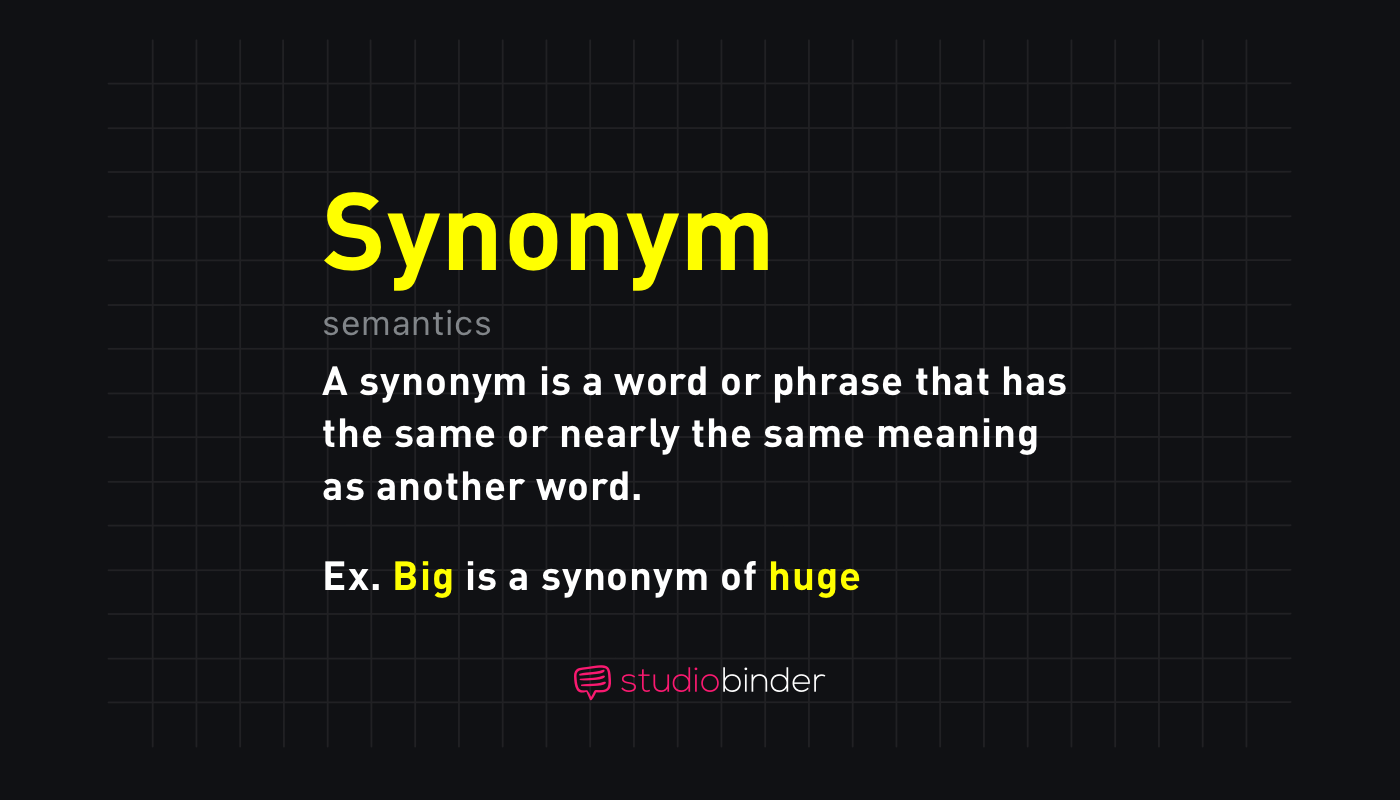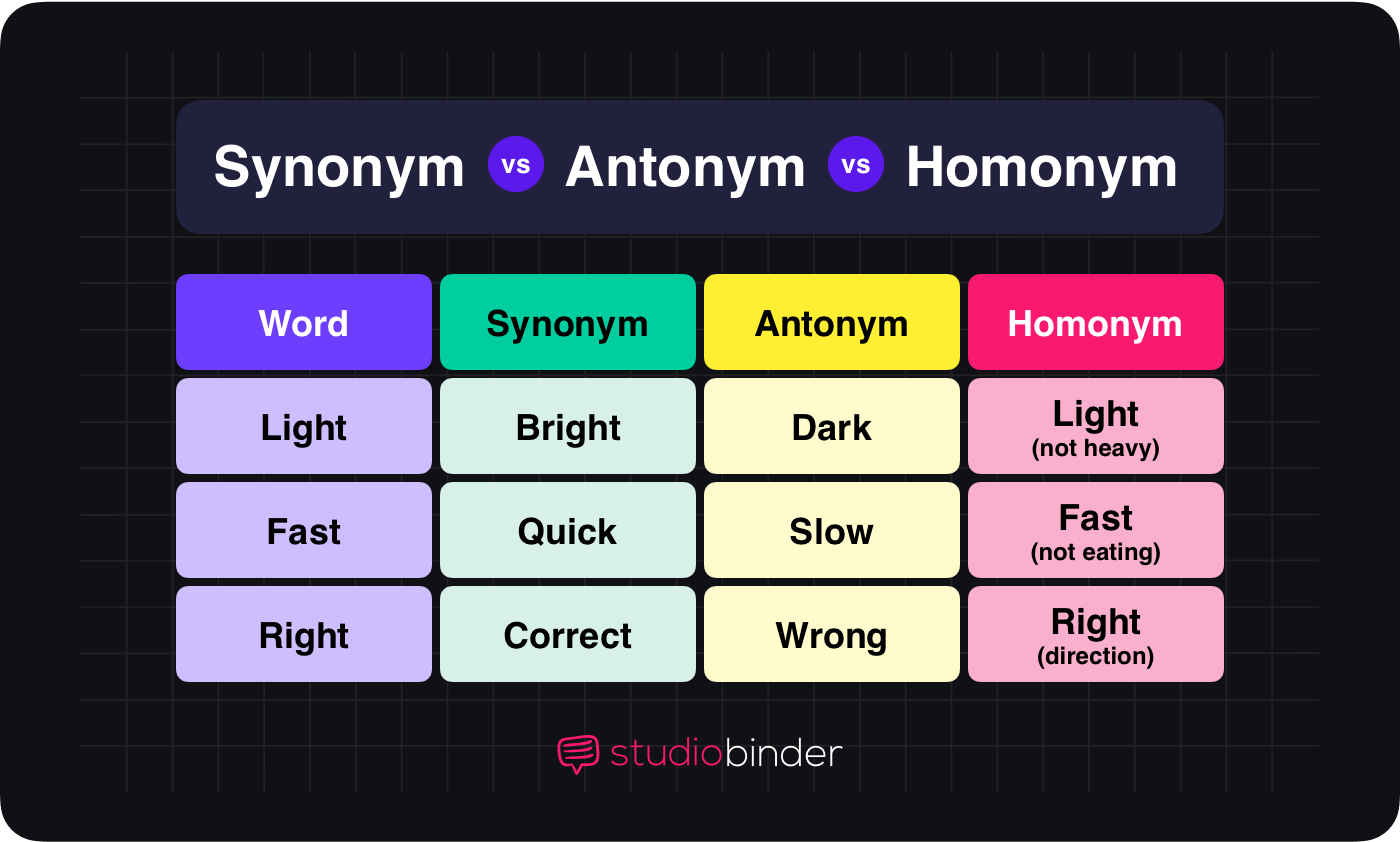Have you ever found your writing or rhetoric redundant? Using the same words and phrases over and over can make any speech or piece of writing grow stale. This is why understanding synonyms can be a lifesaver. When used correctly, synonyms can add variety and interest to your writing while avoiding redundancy. So, let’s crack open the thesaurus and expand our writing!
Quick Definition
What does synonym mean?
Synonyms are words or phrases that have similar meanings but differ in some aspects such as intensity, connotation, or context in language. We use them in our everyday lives all the time but it’s important for writers and speakers to understand how they really work.
Let’s start by learning the synonym definition.

What is a Synonym
SYNONYM DEFINITION
What is a synonym in language?
A synonym, derived from the Greek word "synónymos," is a word or phrase that means exactly or nearly the same as another word or phrase in the same language. 'Syn' means 'with', and 'onyma' means 'name.' Therefore, synonyms are words with the same or similar meanings. They play an integral role in vocabulary building, making our conversations more vibrant and nuanced.
Synonyms are not just about having multiple words for the same thing — they bring diversity and depth to language. Each variation carries a slightly different connotation, allowing us to express ourselves with greater precision. For example, 'happy,' 'joyful,' and 'elated' are all analogous, but each word evokes a subtly different emotional intensity.
Synonym Examples:
- Sad — Morose, Unhappy, Down
- Beautiful — Stunning, Attractive, Gorgeous
- Improve — Enhance, Refine, Upgrade
Common Examples
What are some synonym examples?
When it comes to language, the beauty lies in its diversity and depth. Synonyms can be used in various mediums to add richness and impact to our expressions. And for writers, for whom language is their entire medium, learning all the tricks and techniques will undoubtedly improve your skills.
Words | Synonyms | |||
|---|---|---|---|---|
Happy | Content | Joy | Content | Cheerful |
Big | Large | Huge | Massive | Enormous |
Fast | Quick | Rapid | Speedy | Swift |
Smart | Clever | Intelligent | Bright | Sharp |
Easy | Simple | Effortless | Smooth | Basic |
As you can see from these examples, each variation is slightly different in meaning. As linguist Laurence Urdang noted in his introduction to the Longman Synonym Dictionary, “...there is no such thing as a true ‘synonym'.” As we’ll see, even though the general meanings of these words are similar, they are almost never identical.
In this video, we get a clear and concise understanding of how this linguistic device works and why it is important.
What is a synonym and how do they work?
Now, let’s look at some examples in different mediums to dive even deeper into how they can be used.
Synonyms in Literature
In literature, synonyms are used to add depth and drama to the narrative. A skilled author doesn't just 'walk' their character across a room — they might 'amble,' 'strut,' 'saunter,' or even 'trudge.'
This has two important effects. First, each of these variations carries a unique tone and nuance, painting a more vivid picture of the scene. Basically, it’s more interesting and engaging.
Second, the analogous word you choose for “walk” gives us a different understanding of the character and how they’re feeling or what they’re thinking. If a character “struts,” we understand them to be confident or perhaps slightly arrogant. If they “trudge,” they are ambivalent or reluctant.
Here’s a quote from author P.G. Wodehouse with a rather playful and expressive use of this literary device.
Literature Example
“Intoxicated? The word did not express it by a mile. He was oiled, boiled, fried, plastered, whiffled, sozzled, and blotto.”
— P.G. Wodehouse, Meet Mr. Mulliner
With the simple word choice, you’ve made your character more interesting and better understood by the reader without having to “explain” anything.
Speech Examples
In our everyday conversations and rhetoric, synonyms are the parts of speech that provide variety and keep our audience engaged.
Instead of repeatedly saying you're 'happy,' why not express that you're 'thrilled,' 'overjoyed,' or simply 'at ease'? Each word offers a different shade of emotion, making your speech more vibrant and relatable.
Consider this: would an audience be swayed toward agreeing with you with just a list of facts and figures? Or would a rousing speech with figurative language full of meaningful analogous words be more effective?
Marketing Examples
In marketing, scriptwriters craft compelling stories for brands. They help avoid repetition and ensure messages are engaging. For instance, instead of constantly talking about 'improving' a product, marketers might opt for 'enhancing,' 'upgrading,' or 'refining.' Each equivalent word subtly shifts the perception of the brand, creating a richer narrative.
Everyday Examples
And finally, in our day-to-day lives, synonyms are the unnoticed extras that make our conversations interesting. Take the word 'beautiful' for example. It's simple and straightforward, yet there are countless ways to express the same idea.
For example:
- Stunning
- Gorgeous
- Charming
- Exquisite
Each one adds a unique flavor, enriching our everyday language.
Related Posts
Parallel Words in Action
How do you use synonyms effectively?
Synonyms serve a vital role in keeping our language dynamic and engaging, helping us dodge the pitfall of repetition in writing. Imagine having to use the same word over and over again in a conversation or piece of writing. In this way, word variations are more than just nice-to-haves, but necessary in fully expressing the stories, concepts, and ideas we want to share with clarity.
As Joey on Friends found out, just because you can use a thesaurus, doesn't mean you should.
Synonyms Gone Wrong • Friends
To really get the most out of your use of this device, discernment is key. As lexicographer Laurence Urdang explains, there are three characteristics of words that writers and speakers should consider.
- Frequency: how often the word is used. For example, we say “you” all the time and we say “thee” far less often.
- Distribution: which medium or venue you expect to hear a word. You would expect more formal language in a formal scenario like a presidential speech, and more informal language in late-night host monologue.
- Connotation: the specific meaning of the word in context.
Depending on the context, synonyms can have different meanings or connotations. For example, “aroma” and “odor” are basically equivalents but they carry with them slightly different meanings; the former has a more positive connotation and the latter has a more negative connotation.
As a writer, you’ll do well to understand the nuances to synonyms and connotations. This will help your language be both precise and intentional. And your readers will have a more enjoyable experience as they navigate through the language.
Did You Know?
According to Thesaurus.com, there are over 47 equivalent words for “happy.”
Synonym vs Antonym vs Homonym
Are synonyms different from antonyms?
While synonyms share similar meanings, antonyms, and homonyms represent different types of linguistic relationships. They are all essential tools that, in addition to literary devices, help us navigate the vast and ever-evolving world of language.
This diagram breaks down the main differences between synonyms, antonyms, and homonyms.

Related but different linguistic devices
Antonyms are words with opposite meanings. They provide a clear way to express contrasts and differences. For instance, 'hot' and 'cold,' 'up' and 'down,' 'love' and 'hate' are all pairs of antonyms.
Homonyms, on the other hand, are words that sound the same or are spelled the same but have different meanings. They often lead to interesting wordplay and can be a source of confusion in both spoken and written language.
An example of homonyms is 'bear' (the animal) and 'bare' (meaning uncovered or naked).
While all three of these devices contribute to the richness of a language, they serve different purposes. Synonyms add nuance and variety, antonyms offer contrast, and homonyms add elements of linguistic fun, and complexity.
Conclusion
Wrapping up
As we’ve seen, the power and utility of synonyms in writing and language cannot be underestimated. When writers wield language with precision and nuance, the work comes alive and the reading experience is enhanced. This kind of writing skill begins at the foundational level with similar elements like metaphors and figurative language in general.
Up Next
What are Context Clues?
The written language is more than just words, the magic in great writing lies in how you use those words. Now that we've explored the dynamic world of synonyms, let's turn our attention to another fascinating aspect of language learning and comprehension — context clues.
Up Next: Context Clues in Action →
Frequently Asked Questions
Synonym FAQs
A synonym is a word or phrase that shares the same meaning as another word or phrase. For example, "beautiful" is a synonym of "pretty."
An antonym is the opposite of a synonym. In fact, antonym means a word or phrase that is opposite of a different word or phrase. For example, "beautiful" is an antonym of "ugly."
Synonym is pronounced in three syllables. SIN-oh-nim with the emphasis on the first syllable. It kind of sounds like cinnamon.
There can be multiple synonyms for a word. For example, "hard," "strenuous" and "grueling" are all variations of "difficult."
